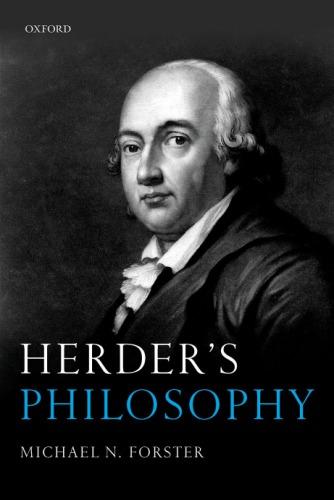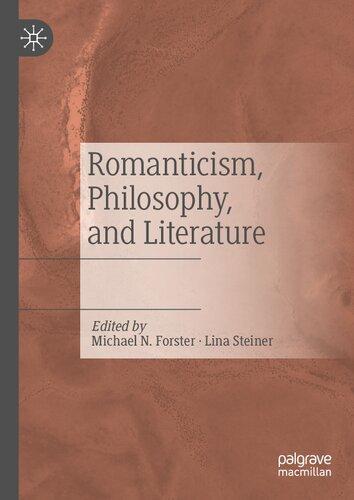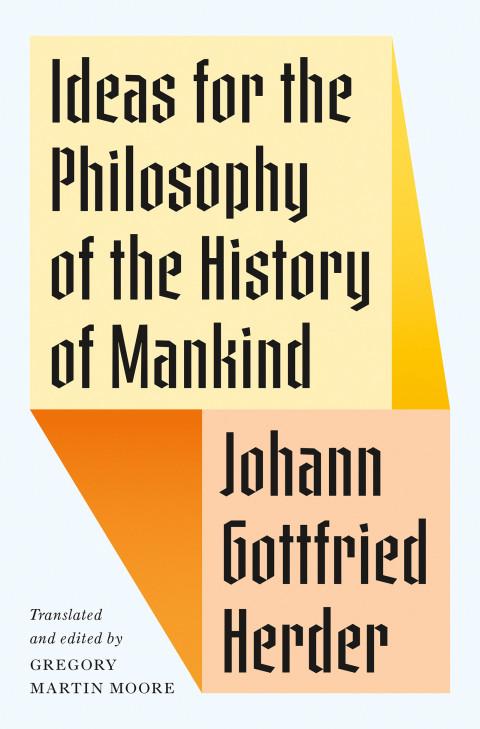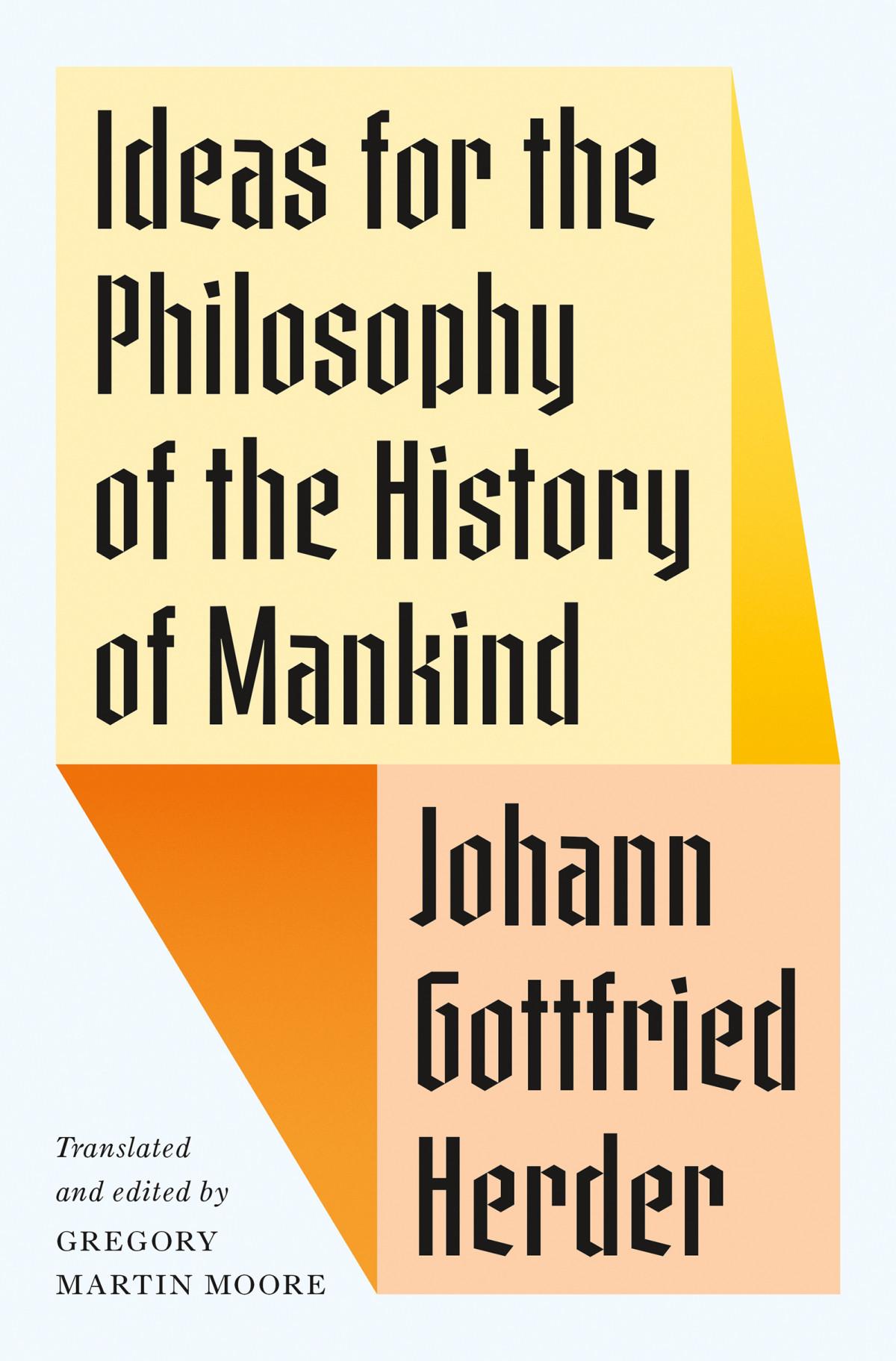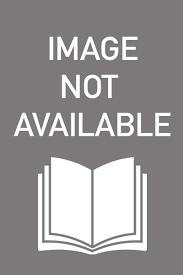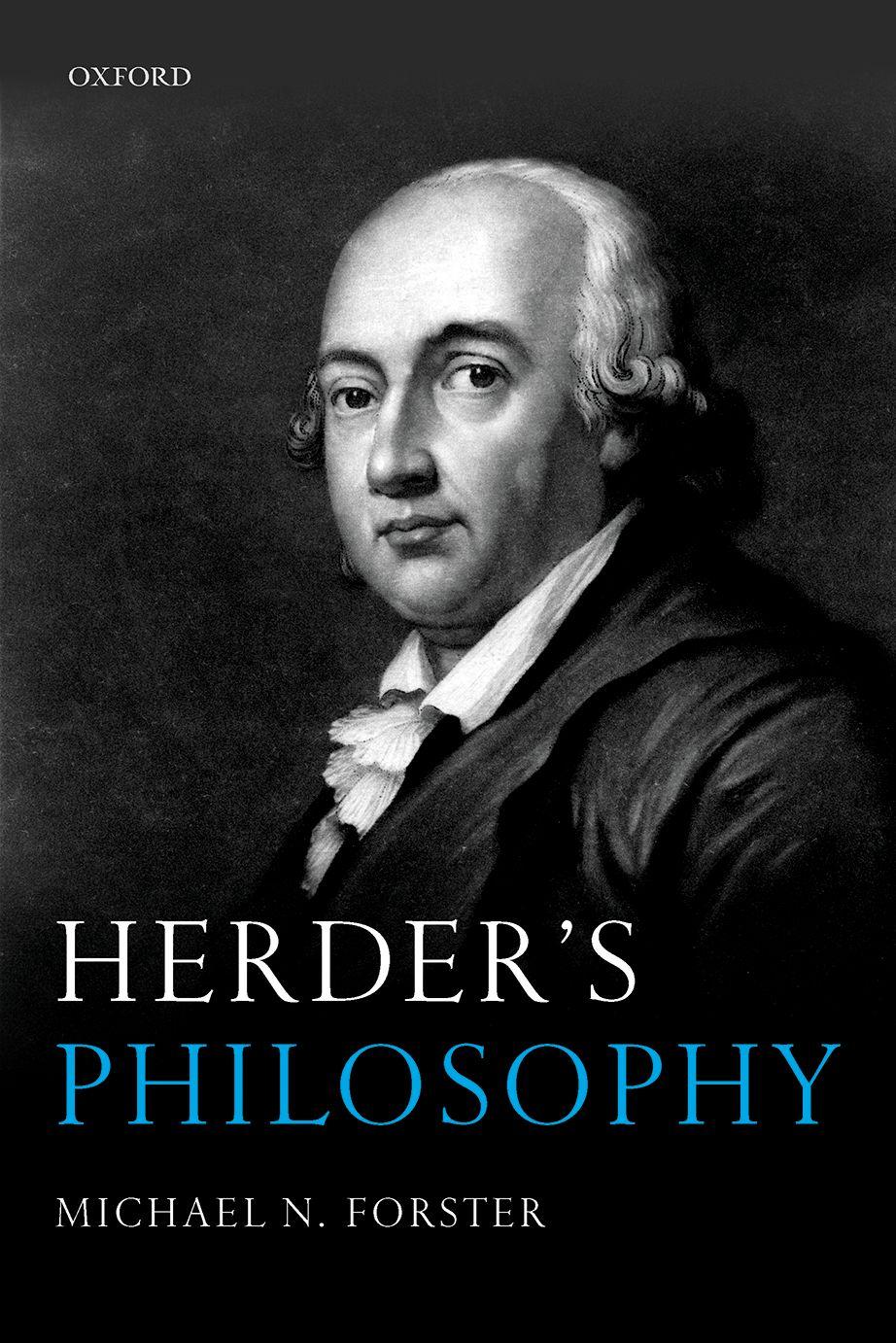Acknowledgments
This book attempts to give an overview of Herder’s philosophy. It is written out of a conviction that his philosophy is of great value, that it has had enormous influence, and that neither of these facts has yet been properly understood. It is also written out of a painful awareness that the very richness of Herder’s ideas and the very extent of their influence make it well nigh impossible for a book like this one to do more than scratch the surface. Still, it will try.
The first half of the book (the Introduction and the chapters on philosophy of language, hermeneutics, translation theory, and the birth of linguistics and anthropology) is largely a more concise and user-friendly reworking of material from two books that I published previously with Oxford University Press: After Herder: Philosophy of Language in the German Tradition (2010) and German Philosophy of Language: From Schlegel to Hegel and Beyond (2011). The second half of the book (the chapters on philosophy of mind, aesthetics, moral philosophy, philosophy of history, political philosophy, philosophy of religion, and intellectual influence) mostly consists of new material.
I have incurred many deep intellectual debts in connection with this project that I would like to acknowledge here. Some of these reach back to my undergraduate education at Oxford, where I learned much about German philosophy from the late Patrick Gardiner, Peter Hacker, Alan Ryan, the late Peter Strawson, Charles Taylor, and Ralph Walker. Other debts are to people from whom I learned as a graduate student at Princeton University: especially, the late Michael Frede, Raymond Geuss, Saul Kripke, and the late Richard Rorty. Yet other debts were incurred during twenty-eight years of full-time teaching at the University of Chicago. Some of these debts are to former colleagues there—including the late Arthur Adkins, Dan Brudney, the late Ted Cohen, Arnold Davidson, Dan Garber, Charles Larmore, Jonathan Lear, Brian Leiter, the late Leonard Linsky, Yitzhak Melamed, the late Ian Mueller, Martha Nussbaum, Bob Richards, Howard Stein, Lina Steiner, Josef Stern, the late George Stocking, and Bill Tait. Others are to former students—including Stephen Engstrom, Susan Hahn, Jim Kreines, Sheela Kumar, Alison Laywine, Alyssa Luboff, Stephen Menn, Nathana O’Brien, Gregg Osborne, Erich Reck, Tim Rosenkoetter, David Sussman, and Rachel Zuckert. I also owe a great debt of gratitude to colleagues in Germany with whom I have worked closely over the years in Heidelberg, Bonn, and Jena. These include Hans-Friedrich Fulda, Markus Gabriel, Wolfram Hogrebe, Guido Kreis, Rainer Schaefer, François Thomas, Klaus Vieweg, and Wolfgang Welsch. Other people who have contributed to the development of this project in various ways and whom I would like to thank include: Karl Ameriks, Andreas Arndt, Jeffrey Barash, Fred Beiser,
Christian Berner, Anne Birien, Paul Boghossian, Rich Booher, Bob Brandom, Horst Bredekamp, the late Rüdiger Bubner, Stefanie Buchenau, Nigel DeSouza, Manuel Dries, Thomas Erikson, Eckhart Förster, Kristin Gjesdal, Hanjo Glock, Marion Heinz, Rolf-Peter Horstmann, John Hyman, Michael Inwood, Mark Johnston, Vasso Kindi, John McDowell, Steffen Mehlich, Ernest Menze, Dalia Nassar, Robert Norton, Michael Rosen, Fred Rush, Richard Schacht, Hans Sluga, Pirmin Stekeler-Weithofer, Jürgen Trabant, Stelios Virvidakis, Anik Waldow, Michael Williams, Claudia Wirsing, Allen Wood, and John Zammito.
Among institutions, I owe large debts of thanks to the University of Chicago where I have taught for over thirty years (formerly full-time, now as a visitor); Bonn University, where I have worked full-time since 2013; and the Alexander von Humboldt Stiftung, whose generous award of an Alexander von Humboldt Professorship to me in 2013 has helped me to complete this project.
In addition, colleagues at the following institutions contributed to this project by inviting me to present parts of it as talks and giving me the benefit of their feedback: the Academy of the Sciences in Moscow, the APA Central Division, the APA Eastern Division, the Aristotle University in Salonica, the University of Athens, the BerlinBrandenburg Academy of the Sciences, the Bildakt-Kolleg of the Humboldt University, Bonn University, the University of Brussels, the University of California at Berkeley, Cambridge University, The University of Chicago, Columbia University, the University of Crete, Drew University, Eikones in Basel, the University of Georgia, Halle University, Harvard University, the Humanities Institute of Osaka, the University of Illinois at Urbana-Champaign, the Institut français in Bonn, the Internationale Hegel Gesellschaft, the Internationale Hegel Vereinigung, the International Society for Nietzsche Studies, Istanbul University, James Madison University, Jena University, Johns Hopkins University, the University of Leuven, the Lomonossov University in Moscow, the University of London, McGill University, the University of Michigan at Ann Arbor, New York University, the Nietzsche Gesellschaft, the University of Notre Dame, Oslo University, Oxford University, the Paris Center of the University of Chicago, the University of Paris at Nanterre, the University of Patras, the Philosophy Department of the Humboldt University, the University of Poitiers, Princeton University, Renmin University in Beijing, Sydney University, Temple University, Toulouse University, Warsaw University, the University of Washington in Seattle, the University of Western Ontario, and the Wissenschaftskolleg in Berlin.
I also owe a debt of thanks to the many presses and journals that have published work of mine that eventually developed into this book. They are too numerous to list here individually, but their names can be found in the notes and bibliography of this volume and in my previous publications on Herder.
I would also like to thank Oxford University Press and especially its Philosophy editor Peter Momtchiloff for suggesting this project to me in the first place and for helping me to bring it to completion. Peter’s encouragement and advice throughout the process were invaluable.
I would also like to thank two anonymous readers for the Press who contributed valuable encouragement and helpful suggestions as the project was approaching its final draft.
Last but not least I would also like to thank my family and loved ones for their love, support, and patience during the many years of work that it took to complete this project: my daughter Alya, my former wife Noha, my parents Michael and the late Kathleen Forster, and Paola Dobelli (who embodies the Herderian values of care for all humankind and compassion towards individuals as perfectly as anyone I know, and to whom this book is dedicated).
Editions
Two German editions of Herder’s works have been used in this volume:
Johann Gottfried Herder Sämtliche Werke, ed. B. Suphan et al. (Berlin: Weidmann, 1877–). Abbreviated as S followed by volume and page number, e.g. S5:261.
Johann Gottfried Herder Werke, ed. U. Gaier et al. (Frankfurt am Main: Deutscher Klassiker Verlag, 1985–). Abbreviated as G followed by volume and page number, e.g. G2:321.
In addition, the following two English translations are cited frequently:
Herder: Philosophical Writings, ed. and tr. M.N. Forster (Cambridge: Cambridge University Press, 2002). Abbreviated as HPW.
Selected Writings on Aesthetics, ed. and tr. G. Moore (Princeton, NJ: Princeton University Press, 2006). Abbreviated as SWA.
(Because I have worked from the German texts throughout, translations in the present book sometimes differ from those in these two volumes when they are cited, without specific notice being given.)
Introduction
This book is an exploration of the philosophy of Johann Gottfried Herder (1744–1803). The restriction of the book’s focus to Herder’s philosophy is non-trivial, since he was also active in several other fields, including literature and theology. The book focuses on topics rather than on texts—in part because Herder usually in a given text runs together treatments of many different topics belonging to several different disciplines, and in part because his treatment of a given philosophical topic is usually spread over a number of texts. Since Herder’s treatments of philosophical topics are extensive, uneven in quality, and sometimes inconsistent, the presentation of them given here is more selective and reconstructive than would be necessary for some other philosophers. In particular, certain strands of his thought that are not particularly original or promising are given rather short shrift. Discussion of the voluminous secondary literature on Herder is also kept to a minimum, partly because much of it is not especially good, partly because discussion of it would only be of interest to a few specialists.
Herder is a philosopher of the very first importance. This judgment largely turns on the intrinsic quality of his ideas, of which the present book will try to give an impression. In order to do so it will focus on the areas in which he made his greatest philosophical contributions: philosophy of language, hermeneutics, the theory of translation, the philosophical foundations of linguistics and anthropology, philosophy of mind, aesthetics, moral philosophy, philosophy of history, political philosophy, and philosophy of religion.
But another aspect of Herder’s great importance as a philosopher lies in his intellectual influence. This has been immense (far greater than is usually realized). For example, Hegel’s philosophy turns out to be largely an elaborate systematic development of Herder’s ideas (concerning language, the mind, history, and God). So too does Schleiermacher’s (concerning language, interpretation, translation, the mind, art, and God). Nietzsche is deeply influenced by Herder as well (concerning language, the mind, history, and moral values). So too is Dilthey (concerning history). Even John Stuart Mill has important debts to Herder (in his liberal political philosophy). And just beyond philosophy, Goethe was transformed from being merely a talented but rather conventional poet into the great artist and thinker he eventually became largely through the early and sustained impact on him of Herder’s ideas.
Indeed, Herder can claim to have supplied the philosophical foundations for whole disciplines that we now take for granted. For example, it was mainly Herder (not, as
has often been supposed, Hamann) who established certain fundamental ideas concerning a dependence of thought on language that underpin modern philosophy of language. It was Herder who, through those same ideas, through his recognition of deep variations in language and thought across historical periods and cultures, including deep variations in grammar, through his strictly empirical approach to the investigation of languages, and in other ways, inspired Friedrich Schlegel and Wilhelm von Humboldt to found modern linguistics. It was Herder who developed the modern theory of interpretation, or “hermeneutics,” in ways that would subsequently be taken over by Schleiermacher and then by the latter’s pupil August Boeckh. It was Herder who, by doing so, made a crucial contribution to establishing the methodological foundations of nineteenth-century German classical scholarship (which rested on the Schleiermacher–Boeckh methodology), and hence of modern classical scholarship more generally. It was Herder who did more than anyone else to establish both the general conception and the interpretive methodology of our modern discipline of cultural anthropology. It was Herder who did more than anyone else to establish the general conception and the methodology of the modern discipline of comparative literature (largely via his influence on Goethe, August Wilhelm Schlegel, and Friedrich Christian Diez). It was Herder who made some of the most important contributions towards establishing modern art history. And finally, it was also Herder who made some of the most essential contributions to the progress of modern biblical scholarship. The present book will touch on all of these contributions and more.
Intellectual Life
It seems appropriate to begin this book with a brief overview of Herder’s life, especially his intellectual life. Who was Herder?
He was born in Mohrungen in East Prussia in 1744. His father was a schoolteacher. His family was caring but poor and deeply religious (Lutheran). He was by nature a bookish loner. Among the negative features of his early life in Mohrungen was the heavy hand of Prussian military conscription that lay over the area. Among the positive features were the natural surroundings, in which he spent much of his free time. In 1761 a local pastor with intellectual aspirations, Sebastian Friedrich Trescho, offered him lodging in return for services as an amanuensis, which allowed him access to Trescho’s library. Then in 1762 a generous Russian military surgeon who was passing through the town was sufficiently impressed by Herder’s abilities to offer to take him to Königsberg in East Prussia and pay for his education there, an offer that he accepted.
In 1762 he enrolled at the University of Königsberg, where he studied with Kant, who accorded him special privileges, such as a waiver of fees, because of his unusual intellectual abilities. At this period he also began a lifelong friendship with the irrationalist religious philosopher Hamann, who taught him English and inspired him with a love of languages and literature, including Shakespeare.
In 1764 he left Königsberg to take up a schoolteaching position in the Baltic town of Riga, a republic within the Russian Empire. Initially employed there as a schoolteacher, following his ordination in the Lutheran church in 1767 he also became a pastor. While in Riga he wrote the important, though fragmentary, programmatic essay How Philosophy Can Become More Universal and Useful for the Benefit of the People [henceforth: How Philosophy Can Become] (1765). He also published his first major work, the Fragments on Recent German Literature [henceforth: Fragments] (1767–8)—a sort of selective commentary on a recently defunct literary journal titled Letters concerning the Most Recent Literature that had been edited and written by some of the leading thinkers of the period (including Lessing and Moses Mendelssohn) in which he discussed aspects of the history of literature, tried to spur the improvement of German literature, and dealt with issues in the philosophy of language and the theory of translation. He subsequently went on to publish three parts of an important work on literature and general aesthetics, the Critical Forests (1769) (an important fourth and final part that was written at the same time was not published until the middle of the nineteenth century). In this work he responded to the aesthetic theories of Lessing, Winckelmann, and less well-known contemporaries, developed his own aesthetic theory, introduced a number of important ideas concerning the interpretation of art and literature, and (in the fourth part) formulated an important theory of perception. In 1769 he resigned his position in Riga and travelled—initially by sea to France. During his travels he wrote an ambitious and passionate Journal of My Travels in the Year 1769 [henceforth: Travel Journal], which among other things offers further fascinating insights into his general philosophical program. While in France he met several leading figures of the Enlightenment, including d’Alembert and Diderot. From France he proceeded to Holland, and then eventually to Strasbourg, where in 1770 he met the young Goethe (fact being stranger than fiction, in an inn called Zum Geist [lit. To the Mind]!). He immediately had a powerful impact on Goethe—an impact that was sustained and deepened as their relationship continued during the several decades that followed. In 1771 he won a prize from the Berlin Academy for his best-known work in the philosophy of language, the Treatise on the Origin of Language [henceforth: Treatise] (published in 1772).
From 1771–6 he served as court preacher to the ruling house in Bückeburg, where the cold militarism of the count who ruled the town, together with severe cultural isolation, made him miserable (he wrote to the poet Gleim in 1772 that his existence there was “a living death”).1 Mitigating this situation a little, in 1773 he married his sweetheart Karoline Flachsland in Darmstadt, with whom he would stay happily married until his death and who would bear him several children. During his period in Bückeburg he published a number of important works, including a seminal essay on
1 Johann Gottfried Herder Briefe, ed. W. Dobbek and G. Arnold (Weimar: Hermann Böhlaus Nachfolger, 1977), 2:198.
the nature of tragedy, Shakespeare (1773), which appeared in a volume called On German Character and Art to which Goethe and Justus Möser also contributed; and his first, and arguably greatest, work on the philosophy of history, This Too a Philosophy of History for the Formation of Humanity [henceforth: This Too] (1774). He also published an interesting but much more questionable work on the Old Testament titled Oldest Document of the Human Species (1774–6) in which he temporarily shifted away from his usually enlightened stance on religion towards a sort of religious irrationalism more in the spirit of his friend Hamann.
After receiving an offer of a chair in theology at Göttingen University in 1775, which turned sour when questions were raised about his orthodoxy and he refused to cooperate by answering them, in 1776, thanks to the influence of Goethe (who had gone to Weimar the year before to serve in its government), he was appointed General Superintendent of the Lutheran clergy in Weimar, a post that combined both religious and educational functions and which he kept for the rest of his life. During this period he published an important essay in the philosophy of mind, On the Cognition and Sensation of the Human Soul [henceforth: On the Cognition and Sensation] (1778); an important translation of, and commentary on, the Song of Solomon from the Old Testament, Songs of Love (1778); a very influential collection of translations of poetry from around the world (including ancient Greece and Rome, Germany, England, Spain, Scotland, Italy, Scandinavia, the Baltic countries, and the Slavic countries) that emphasized simple folk poetry, Popular Songs [Volkslieder] (1778–9); a seminal work on the interpretation of the Old Testament, On the Spirit of Hebrew Poetry (1782–3); his important and well-known later work on the philosophy of history, Ideas for the Philosophy of History of Humanity [henceforth: Ideas] (1784–91) (which his former teacher Kant reviewed condescendingly, thereby provoking a feud between them); an important essay on the philosophy of religion, written in connection with the Pantheism Controversy that had broken out in 1785 between Jacobi and Mendelssohn concerning Spinozism, and conceived in the spirit of Spinoza’s monism, God: Some Conversations (1787); a work written in response to the French Revolution (which Herder welcomed), and largely concerned with aspects of political philosophy, the Letters for the Advancement of Humanity [henceforth: Letters] (1793–7); a series of Christian Writings (1794–8) that dealt with the interpretation of the New Testament; and two works written in sharp opposition to Kant’s critical philosophy, A Metacritique on the Critique of Pure Reason [henceforth: Metacritique] (1799) (directed against the theoretical philosophy of Kant’s Critique of Pure Reason) and the Calligone (1800) (directed against the aesthetics of Kant’s Critique of Judgment).
In addition to the intellectual feud with his former teacher Kant just alluded to, these last years of Herder’s life also brought him many further difficulties and disappointments. His work was subjected to censorship (he had to rewrite the political chapter of the Ideas no fewer than four times before it could pass the censor, who in this case was none other than Goethe). He began to fall out with Goethe in 1793 for reasons that were partly political (their opposite attitudes to the French Revolution), partly aesthetic
(their opposite views concerning classicism and l’art pour l’art), partly moral (Goethe’s lifestyle and poetry, such as his erotic Roman Elegies), and partly more personal— which eventually led to their complete rupture in 1795. In addition, he suffered from social isolation (largely due to his radical political sympathies), overwork, ill health, and financial difficulties. He died in 1803 (a year before his former teacher Kant).
Besides the works mentioned above, Herder also wrote many others over the course of his career (the standard edition of his works, edited by Bernhard Suphan, contains 33 volumes). His earlier works are often his most brilliant. He himself wrote (in On the Cognition and Sensation) that “the first uninhibited work of an author is . . . usually his best; his bloom is unfolding, his soul still dawn.”2 Whether or not that is generally true, it does arguably apply to Herder himself. However, his later works contain many riches as well.
Philosophical Style
Before we consider the substance of Herder’s philosophy, it is appropriate to say something about his philosophical style—by which I mean not only his general way of writing philosophy but also his general way of doing it. This task is especially worth undertaking because his philosophical style can easily be misunderstood, thereby becoming an obstacle to the comprehension of his positions.
In certain ways Herder’s philosophical texts are easier to read than others from the same period. For example, he avoids technical jargon, writes in a manner that is lively and rich in examples rather than dry and abstract, and has no large, complex system for the reader to keep track of. But his texts also have certain stylistic peculiarities that can easily impede a proper appreciation of his thought. So it is important to be alerted to these.
Some of these peculiarities concern his writing in a narrow sense. To begin with, this often seems grammatically undisciplined and emotional—full of discontinued sentences, ungrammaticalities, emphases,3 rhetorical questions, exclamation marks, and so on—in ways that might perhaps be expected in casual speech but not in philosophical texts.
This is quite intentional. Indeed, Herder sometimes deliberately “roughed up” material in this direction between drafts (compare, for example, the 1775 and 1778 drafts of On the Cognition and Sensation).
When writing in this way he is in fact often using rhetorical figures that can easily look like mere carelessness to an untutored eye but which receive high literary sanction from classical sources and are being employed by him artfully. Examples of this are anacoluthon (the deliberate failure to continue a grammatical construction that
2 HPW, p. 219 = G4:367; cf. S8:451–2.
3 In the translations from Herder contained in this volume, all emphases that are not explicitly identified as additions by the translator are Herder’s own. His emphases have occasionally been omitted, though.
has been begun by switching to another), aposiopeisis (breaking off a sentence and leaving the reader to complete it in thought), zeugma (the use with two or more substantives of a verb or adjective that strictly speaking only applies to one of them), hypallage (the agreement of an adjective with another word than the one that it is really meant to qualify), chiasmus (reversing the initial order in a comparison), hendiadys (the use of a singular verb with a plural noun when this really only refers to one thing), oxymoron (a seeming contradiction, usually masking a deeper consistency), anadiplosis (doubling a word or phrase), brachylogy (“shortening”), and hysteron proteron (“later earlier”). Similarly, he often deliberately forms lists and combines verbal moods and tenses in a variety of irregular ways in order to avoid monotony.
More importantly, he has several serious reasons for writing in an undisciplinedlooking and emotional way that is more reminiscent of casual speech than of conventional academic prose. First, he hopes that this will make his writing more broadly accessible and interesting to people—which is a decidedly non-trivial goal for him, since he believes it to be an essential part of philosophy’s vocation to have a broad social impact (see in this connection both the title and the content of How Philosophy Can Become More Universal and Useful for the Benefit of the People).4 Second, he believes that speech is not only historically earlier, but also more expressively fundamental and powerful, than writing (a position that he articulates most fully in the Ideas), and he therefore wants to make his writing as much like speech as possible.5 Third, it is one of his central theses in the philosophy of mind that thought neither is nor should be separate from volition, or affect, that types of thinking that aspire to exclude affect are inherently distorting and inferior; in his view, standard academic writing has this vice, whereas spontaneous speech, and writing that imitates it, avoid it.6 Fourth, he is opposed to any lexical or grammatical straightjacketing of language, any slavish obedience to dictionaries and grammar books.7 In his view, such straightjacketing is inimical, not only to linguistic creativity and inventiveness, but also (much worse), since thought is essentially dependent on and limited in its scope by language, thereby to creativity and inventiveness in thought itself.8 Fifth, moreover it often serves a dubious socio-political function, in that it both results from and supports a broader submissiveness towards authority.9
4 For a discussion of this advantage, see S18:389. 5 See e.g. Letters, G7:19.
6 See in this connection On the Cognition and Sensation
7 The closest Herder ever comes to approving of this is his proposal Idea for the First Patriotic Institute for the Collective Mind of Germany (1787), which does envisage institutional improvement of the way the German language is used (G9/2:565ff., cf. 707ff., 723ff.). However, even this seeming exception proves the rule: the envisaged academy “will take the greatest care to avoid despotic laws concerning language; but all the more strive by means of observations, suggestions, and critical rules to gradually provide our language with the beautiful sure-footedness that in comparison with other languages she still so sorely lacks” (G9/2:572).
8 Concerning this position, see e.g. Travel Journal, S4:451–2.
9 See e.g. Letters, in HPW, p. 378 = G7:337: “And the language of Germans should pull the victory car of others like a conquered prisoner, and in the process still give itself airs in its clumsy empire- and court-style? Throw it away, this oppressive finery, you matron squeezed in contrary to your will, and be what you can be and formerly were: a language of reason, of force and truth.”
Another peculiarity of Herder’s philosophical texts that may initially pose an obstacle to understanding them concerns not so much their writing style as their philosophical style, in particular their unsystematic nature. This is again quite deliberate. For Herder is skeptical about the value of systematicity in philosophy (an attitude that had recently emerged in France with thinkers such as Condillac and d’Alembert as well).10 Thus he already writes in about 1767:
It lies in the weakness of human nature to always want to set up a system; perhaps it also lies in the weakness of human nature never to be able to set one up. He who shows this latter weakness is more useful than the person who sets up three systems.11
He continues to make such statements against systematicity throughout his career, for example in On the Cognition and Sensation, the Letters concerning the Study of Theology [henceforth: Theological Letters] (1780–1), and the Ideas 12 And his hostility to systematicity is also reflected in many of his titles: Fragments [on Recent German Literature], Ideas [for the Philosophy of History of Humanity], Scattered Leaves, and so on. Herder is especially hostile to the ambitious type of systematicity that had already been aspired to in the tradition of Spinoza, Wolff, and Kant and which would soon be aspired to again in the tradition of Fichte, Schelling, and Hegel: roughly, the ideal of a comprehensive philosophical theory whose parts exhibit some sort of strict overall pattern of derivation. This type of systematicity was already very familiar to the young Herder from Spinoza and Wolff, in whom it had taken the more specific form of a series of logical deductions from a set of fundamental principles (Spinoza) or a single fundamental principle (Wolff).
Herder has compelling reasons for this hostility. First, he is very skeptical that such systematic designs can really be made to work, as opposed to merely creating the illusion that they do so (see e.g. On the Cognition and Sensation). Second, he believes that such system-building leads to a premature closure of inquiry, and especially to a disregarding or distortion of new empirical evidence. For example, he writes in the Theological Letters (1780–1):
Premature impudent system-addiction entirely damages true science. As soon as the youth’s limbs and lineaments are developed, he no longer grows. As long as science is dispersed in aphorisms and observations it can grow; fenced and enclosed round by method, it can perhaps be elucidated, polished, made comfortable for use, but it no longer gains in content.13
Scrutiny of the systems of Spinoza, Wolff, Kant, Fichte, Schelling, Hegel, and others amply bears out both of these concerns.
10 See Condillac, Traité des systèmes (1749); d’Alembert, Discours préliminaire (1751).
11 G1:657. Cf. Travel Journal (1769), S4:443, 447, 478.
12 See e.g. a draft of the Ideas, S13:207: “I discount those authors who here and there tore a rag from an often uncertain, misunderstood story, to decorate their system, the pet child of their own minds, with it and to say all the more happily: ‘behold there a picture of humankind.’ Their way shall not be mine, for I have no system to decorate.”
13 G9/1:490.
Herder’s well-grounded hostility to this type of systematicity helped to establish an important counter-tradition in German philosophy that subsequently included, among others, Friedrich Schlegel, Nietzsche, the later Wittgenstein, and Adorno. Nietzsche would memorably sum up the spirit of this counter-tradition in the aphorism: “The will to a system is a lack of integrity.”14
On the other hand, Herder is in favor of “systematicity” in a more modest sense. For he accepts the ideal of a theory that is self-consistent and supported by good arguments.15 His commitment to such an ideal marks an important methodological contrast with Hamann, whom he in particular already criticized for failing to give arguments in an essay from 1765.16 Admittedly, Herder by no means always succeeds in achieving this ideal.17 Interpreting him in a fruitful way consequently requires more selectivity, reconstruction, and philosophical judgment than is the case with some other philosophers.18 But his failure to do so is often more apparent than real.
Let us consider this situation in a little more detail. Concerning first consistency, Herder sometimes explicitly commits himself to an ideal of consistency, for example in the Metacritique 19 It must be conceded that he does not always live up to this ideal. For example, in This Too he holds that different peoples’ moral values are fundamentally discrepant and incommensurable, then in the Ideas he argues that all peoples at least share the fundamental moral value of “humanity,” then finally in the Letters he goes back and forth between those two incompatible positions. However, in many cases in which he initially seems to be guilty of inconsistency he is really not. For (to begin with the more obvious sort of case) he is often developing philosophical dialogues between two or more opposing viewpoints, in which cases it would clearly be a mistake to accuse him of inconsistency in any usual or pejorative sense of the term (see e.g. God: Some Conversations and Letters). And (to turn to a less obvious sort of case) in many other instances he is in effect still working in this dialogue-mode, only without bothering to distribute the competing positions between different interlocutors explicitly, and so is again really innocent of inconsistency (good examples of this occur in How Philosophy Can Become and This Too).
14 F. Nietzsche, Twilight of the Idols, in The Portable Nietzsche, ed. W. Kaufmann (London: Penguin, 1976), p. 470.
15 This may help to explain why he occasionally expresses a more positive attitude towards systematicity— for example, in This Too and at God: Some Conversations, G4:683.
16 G1:38–9.
17 In this connection Charles Taylor has commented wisely that “deeply innovative thinkers don’t have to be rigorous to be the originators of important ideas” (“The Importance of Herder,” in Isaiah Berlin: A Celebration, ed. E. and A. Margalit [Chicago: The University of Chicago Press, 1991], p. 40). Incidentally, the converse is true as well: thinkers can be extremely rigorous without originating any important ideas. (Note for analytic philosophers.)
18 It is all too easy to simply present everything that Herder says on a topic—and thereby leave him looking like a sort of inconsistent, or at best only superficially consistent, eclectic. It is also easy to be selective but in a way that reflects poor philosophical judgment, for example by portraying him as fundamentally committed to Christian religion, metaphysics, a priori inquiry, and universalism—and thereby again leave him looking both unoriginal and mediocre. A recent handbook on Herder manages to combine both of these vices.
19 S21:297.
Moreover, he has serious motives for using this method of (implicit) dialogue. First (and most obviously), when he is dealing with religiously or politically delicate matters, using dialogues permits him to communicate his views without quite stating them as his own and therefore without inviting trouble from the authorities (this applies to God: Some Conversations and the Letters, for example).20 But he also has some less obvious, philosophically deeper motives. Thus, second, he takes over from the precritical Kant an idea (ultimately inspired by ancient skepticism) that the best way for a philosopher to pursue the truth is by setting contrary views on a subject into opposition with each other in order to advance towards, and hopefully attain, the truth through their mutual testing and modification. (Kant recommended the use of such a “zetetic” approach, as he called it following the ancient Pyrrhonists, in his Notice concerning the Structure of Lectures in the Winter Semester 1765–1766 and then implemented it in Dreams of a Spirit Seer, Illustrated Through Dreams of Metaphysics [1766]. Herder already read the latter work before its publication, and in a review he wrote of it in 1766 remarks on its use of the method in question.21) Furthermore, third, Herder also develops a more original variant of that idea on a socio-historical plane: analogously, given the deeply fallible nature of human cognition, truth is an elusive commodity, and consequently the only way for humankind as a whole to attain it is through an ongoing contest between opposing positions on issues, in the course of which the best ones will eventually win out. (This idea is prominent in Dissertation on the Reciprocal Influence of Government and the Sciences [1780] and in the Letters. It anticipates, and indirectly helped to inspire, a similar thesis of John Stuart Mill’s in On Liberty.) This yields a further motive for the dialogue-method, even where it does not lead Herder himself to any definite conclusion, in effect warranting the rhetorical question, “And what does it matter to the cause of humankind and its discovery of the truth whether those various opposing positions are advanced by different people or by the same person?”
This explanation of many of Herder’s inconsistencies as merely apparent also helps to diminish his culpability for the real inconsistencies that remain: these are to a considerable extent merely cases in which an intrinsically defensible and valuable method has got out of control.
Somewhat similarly, concerning arguments: Herder not only complained about Hamann’s failure to give arguments,22 but also himself often lived up to the ideal of
20 Herder describes and thereby reveals this sort of motive in the course of discussing other authors in God: Some Conversations: “In such dangerous matters [as philosophy of religion] a disputing dialectician like Bayle or an ornamenting poet like Voltaire has much advantage over the serious philosopher who sets forth his propositions directly. The former always remain safer because they can say, ‘I only disputed, only ornamented’; and yet they only have an all the more universal effect in this pleasant, ever changing garb” (G4:685–6). Cf. E. Adler, Herder und die deutsche Aufklärung (Vienna: Europa, 1968), pp. 170, 190–5, who makes the similar, though not identical, point that Herder’s inconsistencies often arise due to a conflict between his intellectual views and his religious/political circumstances. Adler’s point is no doubt also true to some extent.
21 S1:130. Cf. Herder’s defense of scholastic disputation in the Ideas, G6:885–6.
22 G1:38.
providing them quite impressively. For example in the Fragments and the Treatise he argues convincingly that a variety of different sorts of empirical evidence all converge on the hypothesis that language is human in origin, and he complements this case with equally cogent arguments against the contrary hypothesis that its origin is divine. And concerning his key thesis in the philosophy of language that thought is essentially dependent on and bounded by language, he not only argues for this on empirical grounds, such as that children always acquire the two in step with each other, but also seeks, and I think ultimately finds, a good conceptual argument for it.
The appearance that Herder neglects to give arguments is often merely an illusion that results from the fact that he as a matter of principle declines to give arguments of certain sorts. For example, he has a strong commitment to empiricism and against apriorism in philosophy, which (while it does not exclude a priori, in particular conceptual, arguments altogether, as we just saw) usually leads him to avoid giving familiar sorts of a priori arguments in philosophy. And he also has a strong commitment to sentimentalism in ethics, which leads him to refrain from offering familiar sorts of cognitivist arguments in ethics.
General Program in Philosophy
The extent of Hamann’s influence on Herder’s thought has sometimes been greatly exaggerated by the secondary literature (e.g. by Isaiah Berlin).23 But Kant’s influence was early, fundamental, and enduring.24
However, the Kant who influenced Herder in this way was not the Kant of the three Critiques (against whom Herder later engaged in the—rather unpleasant, distracting, and ineffectual—public polemics of the Metacritique and the Calligone), but the pre-critical Kant of the early and mid-1760s.25 Some of Kant’s key positions in the 1760s (sharply contrasting with the ones that he would adopt later during the critical period) were: a Pyrrhonist-influenced skepticism about metaphysics; a form of empiricism; and a Hume-influenced sentimentalism in ethics.26 Herder took over these positions from Kant in the 1760s and retained them throughout his career.
23 Cf. Adler, Herder und die deutsche Aufklärung, pp. 63–7.
24 Concerning the relationship between the young Herder and the pre-critical Kant, cf. J. Zammito, Kant, Herder, and the Birth of Modern Anthropology (Chicago: The University of Chicago Press, 2001). There has been a rather heated debate in the secondary literature about whether Herder should be seen as an “irrationalist” or as part of the “Enlightenment” (in the Anglophone world, Isaiah Berlin is the leading proponent of the former view, Robert Norton of the latter). Such a distinction seems to me too blunt a conceptual tool, and Herder’s position too variegated and changing, for this debate to be very helpful in the end. But insofar as it is a legitimate one, my remarks here concerning Herder’s greater indebtedness to Kant than to Hamann imply that he is more an Enlightener than an irrationalist.
25 Cf. Adler, Herder und die deutsche Aufklärung, pp. 56–9.
26 For some further discussion of these positions, especially Kant’s early Pyrrhonist-influenced skepticism about metaphysics, see M.N. Forster, Kant and Skepticism (Princeton, NJ: Princeton University Press, 2008).
It should not be assumed that this debt to the early Kant is a debt to a philosophically inferior Kant, though; a good case could be made for the very opposite.
Herder’s 1765 essay How Philosophy Can Become is a key text for understanding both this debt to Kant and the general orientation of his philosophy as a whole.27 The essay was written under the strong influence of Kant, especially, it seems, Kant’s Dreams of a Spirit Seer (1766), which Kant already sent to Herder prior to its publication (“a sheet at a time,” as Herder reports).28
Herder’s essay answers a prize question that had been set by a society in Berne, Switzerland: “How can the truths of philosophy become more universal and useful for the benefit of the people?” This question was conceived in the spirit of the “popular philosophy [Popularphilosophie]” that was competing with dry, scholastic schoolphilosophy in the German-speaking world at the time. Kant himself tended to identify with Popularphilosophie at this period, and Herder’s decision to answer this prize question shows that he did so as well. However, in Herder’s case, unlike Kant’s, the identification would last a lifetime. Philosophy should become relevant and useful for the people as a whole—this is a fundamental ideal of Herder’s philosophy.
Largely in the service of this ideal, Herder’s essay argues in favor of two sharp turns in philosophy, turns which would again remain fundamental to his position throughout the rest of his career. Let us therefore consider them here (doing so with an eye to certain ways in which he elaborates them in later texts).
The first of these turns consists in a rejection of traditional metaphysics, especially of its concern with the supersensible, and closely follows an argument that Kant had developed in Dreams of a Spirit Seer. Herder’s case is roughly as follows: (1) Traditional metaphysics, by undertaking to transcend experience (or strictly speaking, a little more broadly, “healthy understanding,” which includes, in addition to experience, or empirical knowledge, also ordinary morality, intuitive logic, and mathematics), succumbs to the weakness that it generates contradictory claims that are supportable by equally convincing arguments, and hence to the Pyrrhonian skeptical problem of an equal plausibility on both sides of issues requiring a suspension of judgment about them (“I am writing for Pyrrhonists,” Herder tells us).29 This had also been Kant’s most fundamental objection to traditional metaphysics concerning the supersensible in Dreams of a Spirit Seer. Another sort of objection that Kant had developed there had assumed an empiricist theory of concepts and argued that the terms that supersensible metaphysics uses lack the basis in experience that is required for meaningfulness, and are therefore meaningless. Herder implies this sort of objection as well.30 Herder also
27 Another relatively early programmatic text that is illuminating for the general orientation of his philosophy (though less so for his debt to Kant) is his Travel Journal from 1769. This text in particular includes certain topics that are more or less absent from How Philosophy Can Become, such as political philosophy and philosophy of history.
28 Herder Briefe, 2:259.
29 How Philosophy Can Become, HPW, pp. 3–4, 8, 16 = G1:104–5, 110, 118–20.
30 How Philosophy Can Become, HPW, p. 17 = G1:120–1. Herder’s own (quasi-)empiricist theory of concepts, already reflected in his Essay on Being (1763–4), will be examined in Chapter 1. After How

